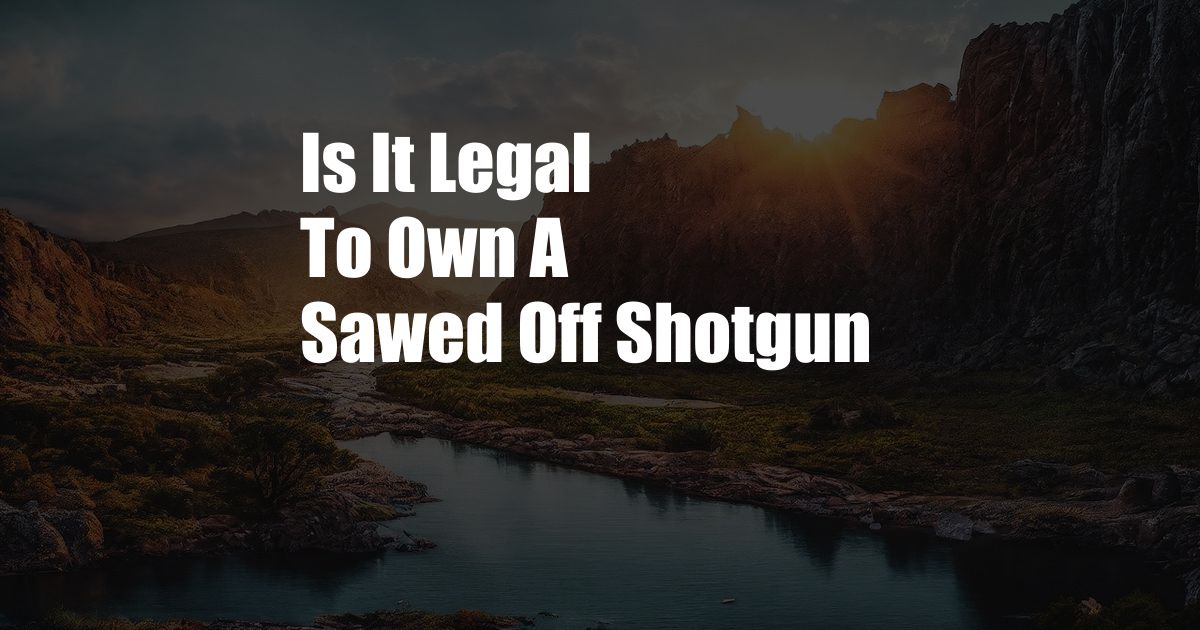
Is It Legal to Own a Sawed-Off Shotgun?
In the realm of firearms, few designs stir up as much controversy as the sawed-off shotgun. Its compact form and intimidating appearance have earned it both a legendary status and a place on the radar of law enforcement. But is it legal to own one? The answer, as we shall explore, is not as straightforward as one might think.
Before delving into the legality, it’s important to define what constitutes a sawed-off shotgun. According to the National Firearms Act of 1934, a sawed-off shotgun is any shotgun with a barrel length of less than 18 inches or an overall length of less than 26 inches.
The National Firearms Act and Sawed-Off Shotguns
The National Firearms Act (NFA) is a comprehensive federal law that regulates the possession, transfer, and manufacturing of certain firearms, including sawed-off shotguns. The NFA imposes strict controls on these weapons due to their perceived danger and potential for concealed carry.
To legally own a sawed-off shotgun, one must comply with all NFA regulations. This includes obtaining a special tax stamp from the Bureau of Alcohol, Tobacco, Firearms, and Explosives (ATF). The tax stamp process involves a thorough background check, fingerprinting, and a hefty fee.
It’s important to note that the NFA does not outright prohibit the ownership of sawed-off shotguns. However, the stringent regulations and heavy penalties associated with their possession make it a highly challenging and costly endeavor.
State Laws and Sawed-Off Shotguns
Beyond the NFA, individual states may impose additional restrictions or prohibitions on sawed-off shotguns. Some states have adopted their own definitions of what constitutes a sawed-off shotgun, and the penalties for violating these laws can vary significantly.
For instance, in California, sawed-off shotguns are defined as any shotgun with a barrel length of less than 20 inches or an overall length of less than 30 inches. Possession of such a firearm is a felony punishable by up to three years in prison.
Exemptions and Exceptions
Despite the general prohibition on sawed-off shotguns, certain exemptions and exceptions exist. For example, individuals who are licensed to manufacture or deal in firearms may be exempt from the NFA requirements.
Additionally, some states allow for the possession of sawed-off shotguns for specific purposes, such as pest control or historical reenactments. However, these exemptions are narrow and subject to strict regulations.
Tips for Staying Informed and Compliant
Given the complex legal landscape surrounding sawed-off shotguns, it’s essential to remain informed and compliant with all applicable laws. Here are some tips to help you stay on the right side of the law:
1. Consult with a knowledgeable attorney who specializes in firearms law.
2. Familiarize yourself with both federal and state laws regarding sawed-off shotguns.
3. If you inherit or come into possession of a sawed-off shotgun, contact the ATF immediately.
4. Keep all necessary paperwork and documentation related to your firearm.
FAQ on Sawed-Off Shotguns
Can I legally purchase a sawed-off shotgun?
Yes, it is possible to purchase a sawed-off shotgun, but it requires obtaining a special tax stamp from the ATF and complying with all applicable laws.
What are the penalties for possessing an illegal sawed-off shotgun?
Penalties vary depending on the jurisdiction and the specific circumstances, but they can include fines, imprisonment, and the forfeiture of the firearm.
Are there any legitimate uses for a sawed-off shotgun?
While their primary purpose is often associated with criminal activity, sawed-off shotguns may be used for pest control or historical reenactments in some states, subject to strict regulations.
Conclusion
Navigating the legal landscape surrounding sawed-off shotguns is no easy feat. By understanding the intricacies of the National Firearms Act, state laws, and the nuances of exemptions, individuals can stay informed and compliant. If you have any further questions or concerns, consulting with an experienced attorney is highly recommended. Stay informed, stay safe, and engage in responsible firearm ownership.
Would you like to receive updates and insights on firearms-related topics?